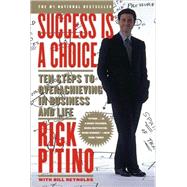
Note: Supplemental materials are not guaranteed with Rental or Used book purchases.
Purchase Benefits
What is included with this book?
| Deserving Victory | p. 1 |
| Build Self-Esteem | p. 11 |
| Set Demanding Goals | p. 45 |
| Always Be Positive | p. 71 |
| Establish Good Habits | p. 93 |
| Master the Art of Communication | p. 117 |
| Learn from Role Models | p. 141 |
| Thrive on Pressure | p. 163 |
| Be Ferociously Persistent | p. 191 |
| Learn from Adversity | p. 217 |
| Survive Success | p. 239 |
| Overachieving in Business and Life | p. 259 |
| Table of Contents provided by Blackwell. All Rights Reserved. |
The New copy of this book will include any supplemental materials advertised. Please check the title of the book to determine if it should include any access cards, study guides, lab manuals, CDs, etc.
The Used, Rental and eBook copies of this book are not guaranteed to include any supplemental materials. Typically, only the book itself is included. This is true even if the title states it includes any access cards, study guides, lab manuals, CDs, etc.
Excerpted from Success Is a Choice: Ten Steps to Overachieving in Business and Life by Rick Pitino, Bill Reynolds
All rights reserved by the original copyright owners. Excerpts are provided for display purposes only and may not be reproduced, reprinted or distributed without the written permission of the publisher.